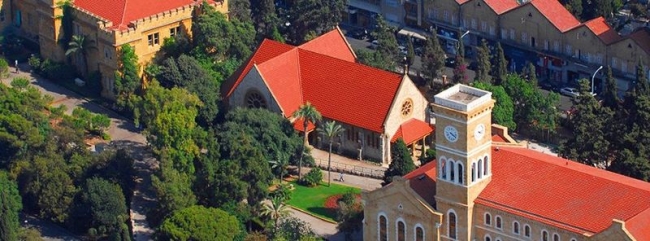You have /5 articles left.
Sign up for a free account or log in.

American University of Beirut
Wikimedia Commons
About 30 students from the Palestinian territories studying on U.S. State Department-sponsored scholarships will see their funding lapse at the end of this month as a result of what their institutions have been told is an unintended consequence of the Anti-Terrorism Clarification Act of 2018, which was signed into law in October.
The students are beneficiaries of the U.S. Middle East Partnership Initiative’s Tomorrow’s Leaders scholarship program, which provides scholarships to financially disadvantaged students from the Middle East and North Africa to study at two American-accredited institutions in the region, the American University of Beirut and Lebanese American University.
The suspension in scholarship funding has sent the host institutions in search of alternative funding for their enrolled students. AUB said it is committed to securing the $1.2 million it will take to allow the 16 Palestinian students who are currently enrolled on Tomorrow’s Leaders scholarships to finish their degrees and graduate. "At the university, we feel a profound sense of obligation to all of our students and our decision to support Palestinian scholars of the MEPI-TL program is aligned with the values of AUB which are aspirational, egalitarian, and enduring," AUB said in a statement.
LAU says it has 13 Palestinian students who are affected and that it has committed to covering their funding through this spring. “Our leadership is working to finding a solution for these students post-spring 2019,” a spokesman said.
Both AUB and LAU were told the change is a result of the Anti-Terrorism Clarification Act, or ATCA, a law intended to make it easier for American victims of terror attacks to pursue civil litigation against entities alleged to have provided terrorists with material support by tying acceptance of certain forms of U.S. government assistance to legal liability for antiterror civil claims filed in U.S. courts.
Scott R. Anderson, the David M. Rubenstein Fellow in Governance Studies at the Brookings Institution and a former State Department attorney, has written that the ATCA “specifically responds to rulings in two recent [Anti-Terrorism Act] cases, Waldman v. Palestine Liberation Organization and Livnat v. Palestinian Authority. In both cases, either the plaintiffs or their family members were killed or injured in terrorist attacks in Israel or the West Bank, which the plaintiffs allege were facilitated by the Palestinian Authority and PLO. The Waldman plaintiffs secured a favorable judgment providing for $655.5 million in damages in district court, but the judgment was vacated on appeal and their action dismissed. In doing so, the U.S. Court of Appeals for the Second Circuit held that that the Palestinian Authority and PLO lacked the close ties to the United States necessary for the court to exercise general personal jurisdiction over them and that the attacks did not specifically target Americans or otherwise purposefully affect the United States as would be necessary for the court to exercise specific personal jurisdiction in relation to those events. Both the district court and the U.S. Court of Appeals for the D.C. Circuit reached a similar conclusion in Livnat … The ATCA attempts to do away with these barriers by linking jurisdiction to U.S. foreign assistance.”
Rather than subject itself to such liability, the Palestinian government has said that as of Jan. 31 it will forgo the types of U.S. aid -- including the economic assistance funds that pay for the Tomorrow's Leaders scholarship program -- named in the act. Anderson said in an interview that it appears that out of an abundance of caution the government is restricting the ability of private or nonprofit entities in the Palestinian territories to accept this assistance as well.
The impact of ATCA comes in the wake of major cuts to U.S. economic aid to the Palestinian territories, including assistance for school construction. NPR reported that the U.S. cut more than half a billion dollars in aid to Palestinians in 2018, and that a remaining $30 million in economic aid is jeopardized by ATCA.
"The tragic unintended consequences of the understanding of the Anti-Terrorism Clarification Act means that programs for individuals who have no connectivity to the Palestinian Authority or the Palestinian Liberation Organization" -- including students trying to pursue a higher education -- "will be terminated through no fault of their own," said Joel Braunold, the executive director for the Alliance for Middle East Peace, a coalition of more than 100 organizations focused on people-to-people exchanges. "These obligations that the U.S. government has made to these groups as part of obligated agreements and contracts should be sacrosanct."
The State Department press office did not respond to a request for information about the suspension of Tomorrow's Leaders scholarship funding for Palestinians and whether there are impacts on other State Department-sponsored exchange programs. In a form email, the press office said it is operating at reduced capacity due to the government shutdown.




